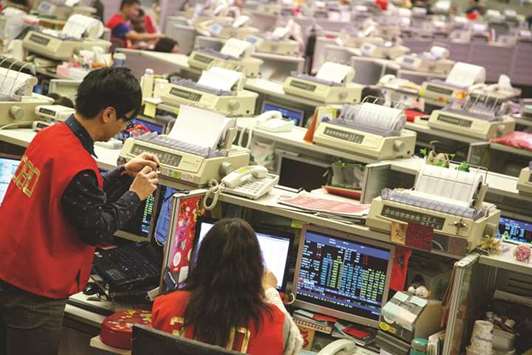Investors were once again provided a strong lead from Wall Street where all three main indexes advanced to new all-time highs, with energy firms riding a surge in oil prices.
Confidence across world markets is booming on the back of a healthy economic outlook and optimism about corporate profits heading into the latest earnings season.
Hong Kong surged 0.9 % to 31,412.54, supported by flows of cash from mainland Chinese investors attracted by cheaper valuations than at home.
The rally has put the Hang Seng Index within 2% of its record high that was set in October 2007.
Shanghai finished 0.1 % up at 3,428.94, an 11th successive gain.
Data showed China’s exports and imports jumped last year on the back of a strong global economy, though an increase in its trade surplus with the US raised the possibility of further blowback from Donald Trump, who has often hit out at what he sees as Beijing’s unfair trade practices.
Seoul added 0.3%.
Singapore climbed 0.4% and Taipei put on 0.7%.
Sydney was marginally higher.
However, Tokyo ended 0.2% lower at 23,653.82 on a stronger yen.
The Japanese unit has strengthened this week after the country’s central bank cut back on its bond-buying stimulus programme.
The dollar fell towards 111 yen briefly Thursday, its lowest since November, with disappointing US factory gate inflation adding downward pressure.
The euro also ticked up against the greenback after minutes from the European Central Bank’s December board meeting showed members were considering altering their guidance on policy in light of the eurozone’s improving economy.
That suggests policymakers are leading towards winding in their own crisis-era stimulus programme, putting it on course to synchronise with the US Federal Reserve, which is already in the process of raising interest rates. “The big picture is that any shift in communication, whether it happens in March or June or if it’s gradual or hawkish, now seems to be backed by the majority of the governing council, which didn’t seem to be the case in October,” Frederik Ducrozet, an economist at Banque Pictet & Cie in Geneva, told Bloomberg News.
The euro, which had eased slightly this week, bounced back above $1.20 Thursday and was consolidating in Asia.
Stephen Innes, head of Asia-Pacific trading at OANDA, said in a note: “The ECB minutes caught traders flat-footed as most had shallow expectations from the release” of the minutes. Oil prices saw small dips after their recent run-up, which saw Brent break the $70 mark Thursday for the first time since late December 2014 thanks to plunging US stockpiles, unrest in key producer Iran and speculation about fresh sanctions on Tehran by the Trump
administration.

